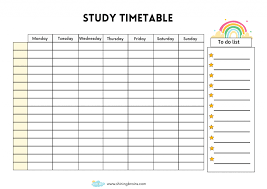
When it comes to studying and revising for exams (especially in year 12), a study plan is a necessary tool that can help tailor your lifestyle and better plan your days for optimal use of your time. Many students are told to study 3 hours per night but that approach doesn’t work for everyone; some may have after-school jobs or hobbies, which they certainly should not give up! Some students may find they are more productive with longer study sessions on the weekends rather than short sessions during the weekdays.
I like to tell my students that 2 hours per week should be dedicated per unit of a subject. So for a 2-unit subject, 4 hours should be dedicated throughout the week. By doing this, it ensures that each subject gets the right amount of attention and revision, rather than just focusing on the subjects that are most enjoyable.
By planning out a timetable, students are able to enjoy after-school activities and have a life outside of school while still studying an adequate time for each and every subject. This also prevents procrastination, as students know exactly what to do and when to do it, providing the motivation to just start studying.
For my students I usually tell them to use the study planner provided by NSW government (https://education.nsw.gov.au/content/dam/main-education/en/home/public-schools/practical-help-for-parents-and-carers/help-with-homework/Study-timetable.docx)
Using a planner can help with organisation and is such a useful tool during year 12 and even in the earlier years when students feel they are too unmotivated to study and just need that slight push to success!
Lily Powell

